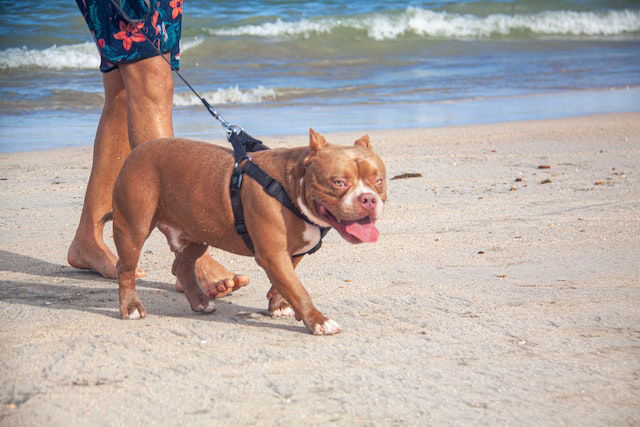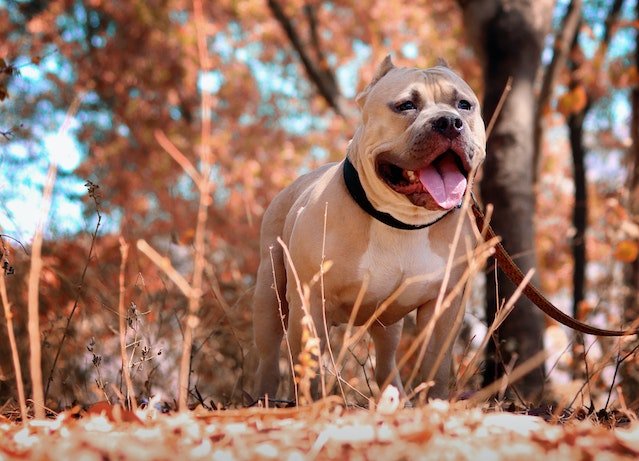We're an affiliate
We hope you love the products we recommend! Just so you know, we may collect a share of sales or other compensation from the links on this page at no additional cost to you. Thank you if you use our links, we really appreciate it!
The American Pit Bull Terriers, or simply ‘Pitbulls’, are renowned for their muscular build, strength, agility, and friendly nature towards people.
Opinions differ on whether Pitbulls can still use their strength and agility to protect their owners. Are they good guard dogs? Not really.
To understand why, we need to go back in time to when Pitbulls were first bred.
Are Pitbulls Good Guard Dogs?
Contrary to popular belief, Pitbulls are not typically good guard dogs due to their friendly nature towards humans.
It’s not recommended to rely on an average Pitbull to protect your home and property from an invasion or attack.
While they can be trained to be watchful, they are not known for their protective instincts. They are diligent, meaning they can raise an alarm when they perceive an intruder, but they will not wage an attack.
Natural Traits of Pitbulls
Despite their muscular physique and intimidating looks, Pit Bulls are fun-loving in nature and are friendly and clingy to humans especially those who care for them.
Pitbulls are often considered gentle giants due to their well-built bodies and their welcoming attitude towards strangers who enter their territories
You should not be surprised to see your Pitbull happily running to welcome visitors to your home and jumping over them with hugs and kisses.
These dogs cherish being around humans and will go the extra mile to please us to receive some praise and petting.
Pitbulls’ love for humans can best be seen in how they interact with children. This lovable breed is affectionate with toddlers and loves to engage in endless games with them.
However, it is important to remember that all children should be taught how to interact with dogs and should be supervised by adults at all times during such interactions.
The Importance of Training and Socialization
Despite their natural instincts to love humans, you should always train and socialize your Pitbull to become a friendly family pet.
Teaching your lovely Pit basic commands and obedience skills will help in daily interactions and allow you to recall them from potentially hazardous situations.

A well-socialized dog is also less likely to show unfriendly behavior toward guests and strangers. Taking your Pit Bull out for daily walks and occasional visits to the park to interact with other pets and humans will help with socialization and prevent fear-related aggression.
Comparing Pitbulls to Other Guard Dog Breeds
Even though you can train your Pitbull to keep watch over your house and property for invasion, they may not be excellent guard dogs compared to other favorable breeds.
The best they can do is bark at a stranger to alert you of an unwanted guest and back off when you don’t show up.
Dogs such as German Shepherds, Doberman Pinschers, Bullmastiffs, Cane Corso, and Australian Shepherds are naturally born to protect and hence can serve as excellent guard dogs.
Why Pitbulls Are Not Good Guard Dogs
The ability of Pitbulls to serve as decent guard dogs for home and property can be attributed to their friendly traits.
Although Pitbulls were originally bred for dogfighting, they were later introduced to the working culture which molded their lovely nature to humans.
These dogs are very friendly to people and kids they derive lots of pleasure when staying close to their human caregivers, kids, and strangers as well.
Pitbulls are socially oriented, meaning that they love exploring their environment to discover new people, other pets, and exciting activities to engage in.
These gentle giants are also moderate barkers, which means they can serve well in creating an alert when an intruder jumps into your yard.
But they pretty much don’t offer anything more than that, and their loud barking may impact their ability to guard silently.
Benefits of Owning a Pitbull as a Guard Dog
One of the main advantages of training your Pitbull to serve as a guard dog is that they are very loyal and they wouldn’t watch you get harassed during an attack.
It’s during such moments when the Pitbull will show their bravery by confronting a potential threat to protect you due to their unwavering loyalty.
Although their protection might not be as intensive as that of a natural guard dog, you can be assured that your canine friend will do something to save you.

Pitbulls are also known for being intelligent and responsive to command training. Having a guard dog with these traits means that you can recall them from potentially dangerous situations, and they can also differentiate between a visitor and an intruder.
These muscular dogs are highly alert and have the ability to track scents and categorize different smells, which can make them observant of an intruder.
Drawbacks of Owning a Pitbull as a Guard Dog
While there could be some benefits to training your Pitbull to be protective of your home and property, these pups do not make decent guard dogs.
The major drawback of having a Pitbull as a guard dog is their incredibly friendly nature, which can extend to visitors and strangers.
Training a Pitbull to become a guard dog may be a difficult task, and sometimes, you may require the services of a canine trainer.
Even if you train your Pitbull to serve as a guard dog, they may still embrace an intruder and try to make friends.
Pitbulls are not naturally protective animals. They may sometimes show aggression towards other animals due to their dogfighting instincts, but they are typically friendly to humans unless provoked.
Pitbulls’ bad historical reputation may also impact your ownership of this breed in some states and provinces.
These muscular dogs were bred to fight other dogs, which some people consider unethical. This bad historical connotation has made it difficult to obtain insurance for this breed, and some municipalities also restrict homeowners from raising Pits completely.
Frequently Asked Questions (FAQs)
1. Are Pitbulls aggressive by nature?
No! Pitbulls are not inherently aggressive despite being bred for dogfighting purposes. However, they may become hostile when provoked into anger.
2. Can Pitbulls be trained to be good family dogs and guard dogs at the same time?
Yes! You can train your Pitbull to be protective and affectionate towards your family at the same time.
While they may not be the best protective dogs, they can be vigilant to alert you when a stranger knocks while also being friendly to your family.
3. Are Pitbulls protective?
Yes! These muscular giants can be protective of their owners.
However, it is unlikely that a newly adopted Pitbull without proper training can come to the defense of their owner.
4. How do I know if my pitbull will protect me?
You can know if your Pitbull can protect you when faced with a threat if they have unwavering loyalty to you with lots of love.
Training your dog on protective instincts can boost their chances of guarding you against intruders or aggressive animals.
Conclusion
Pitbulls are not good as guard dogs. The best an average Pitbull can do is alert their owner by barking at the intruder.
These dogs were originally bred for dogfighting and ratting competitions, but they were transitioned into working breeds during the early 20th century.
Pitbulls are known to be people-oriented and they love making friends with humans which explains, which explains why they thrive as family dogs.
However, a loyal & well-trained Pitbull may come to the rescue if their owners are faced with potentially dangerous situations.
Laura is the founder of Furs'n'Paws. She is a also a pet writer and expert with more than 20 years of experience of working with dogs and cats. She developed a very strong love for animals at a young age. Her passion led her to establish a thriving pet sitting and dog walking business in Dubai. As an expert in pet training, behavior, and nutrition, Laura is committed to helping pet owners and pet lovers by offering high-quality information on a wide range of topics.



2 Responses
Excellent article- these sweet dogs are misunderstood and deserve the most love! Every good thing in this world takes work and I couldn’t be more happy with our baby
Very true, thanks for your comment!